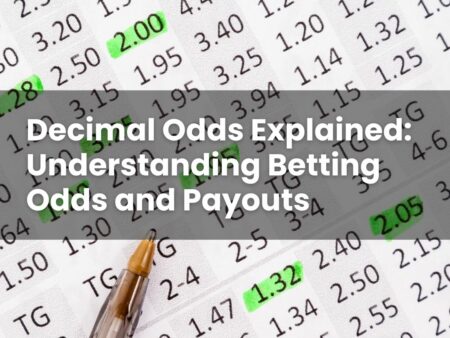In sports betting, odds can sometimes shift quite quickly. You might notice this just before a football match starts, or even while it’s happening. When odds change sharply in a short space of time, this is known as fast dropping odds.
This blog explores what can cause these sudden shifts, what they might suggest, and how they are used by bookmakers and bettors alike.
We’ll explain why the odds move, what that could mean, and what to consider before placing a bet. Understanding how the odds behave may help you follow the markets more confidently, especially when you know what these changes really represent.
How Odds Can Drop in Betting
Odds show the potential return from a bet. If the odds drop, the possible payout gets smaller. In UK sports betting, you’ll often see fractional odds, like 3/1 or 2/1. These mean you could win £3 or £2, respectively, for every £1 staked, plus your original stake back.
Let’s say a football team is priced at 3/1 in the morning, but by lunchtime, the odds fall to 2/1. This shift suggests that bookmakers now think the team has a higher chance of winning than earlier. Odds can drop when new information changes how the match may go, or when many people start betting on the same outcome.
Bookmakers use different tools and sources to update their odds. These can include team announcements, injuries, betting patterns, and data from betting exchanges. Each company may interpret this information differently, which is why the odds aren’t identical across all betting sites. For example, one bookmaker might still offer 5/2, while another has already dropped to 2/1.
Before placing a bet, it can be useful to check a few sites. Look at the odds, but also read the terms and conditions. Each bookmaker sets their own rules, and these can affect how your bet is settled.
The Reasons Behind Sudden Odds Shifts
If the odds drop quickly, it’s rarely random. Bookmakers adjust their prices to reflect the most up-to-date situation. This helps them to manage risk and keep the market balanced.
Here are some of the most common reasons for a sudden drop:
- Confirmed team line-ups: If a key player is unexpectedly starting, it can change how people might view the match.
- High betting volume: A large number of bets on one outcome can lead the bookmaker to shorten the price to try and limit any potential payouts.
- Changes in conditions: For example, in cricket or tennis, unexpected rain might affect the match and the odds.
- Expert analysis or breaking news: A comment from a respected pundit or late news from journalists can shift betting interest.
- Betting exchange activity: Since exchanges let people set their own prices, bookmakers often monitor them and adjust their odds accordingly.
Odds can move differently at each bookmaker, depending on how fast they respond or how they assess the situation. This is one reason why comparing prices can be useful if you’re trying to understand what the market is reacting to.
Dropping Odds Strategy Explained
A “dropping odds” strategy involves placing a bet as the odds are falling, with the aim of acting before they fall further. Some people see this movement as a sign that something important has changed — such as a team update or a sudden rise in betting volume.
For example, if you see a horse priced at 6/1 in the morning and it drops to 4/1 by the afternoon, you might choose to bet before it falls to 3/1 or lower. The idea is to try and spot the movement early and place your bet while the price still seems favourable.
This approach often involves checking several bookmakers regularly and looking for any potential signs that the odds are moving. There are websites and tools that show when prices are shortening, but interpreting that information still comes with uncertainty.
It’s important to note that dropping odds do not reveal the result of an event. They reflect changes in the perceived likelihood or market activity — not certainty. Whether odds are falling or rising, there is always a degree of chance involved, and the result may go against expectations.
Should You Bet on Dropping Odds?
Whether betting on dropping odds makes sense for you depends on your personal preferences. Some people use falling odds as a guide that something has changed in the market. Others may prefer to back outcomes with longer odds for potentially bigger returns, accepting a lower probability.
If you see that England’s rugby odds have shortened from 5/1 to 3/1, it could suggest more confidence in their chances. But that doesn’t mean the outcome is now “likely” — it simply means the bookmaker has adjusted the price based on new information or demand.
There’s no guaranteed way to beat the system. Every match, race, or event has an element of unpredictability. The odds can help you understand what the bookmaker believes about the likelihood of different outcomes, but they cannot predict what will actually happen.
Some people might choose to start with small stakes while they learn how the odds can move. Others may prefer to stay with markets they know well. The key is to make choices that feel right for you, based on the information you have and the limits you’re comfortable with.
If you choose to bet, keep it enjoyable by setting a budget and avoiding chasing losses. Take breaks and keep track of how often you’re betting.
If it ever feels like too much, free and confidential support is available at BeGambleAware.org and GamCare.
Betting is always a personal choice, and outcomes can never be guaranteed.








